Education
-
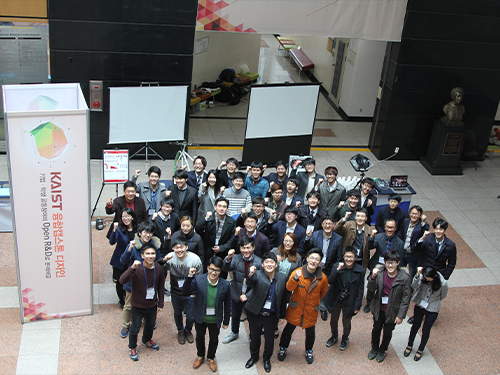 The Final Presentation of the 2015 Interdisciplinary Convergence Capstone Design Takes Place on Campus
The final presentation of the 2015 Interdisciplinary Convergence Capstone Design took place in the lobby of the Creative Lecture Hall on December 11, 2015.
Started in the spring of 2014, the capstone design course offers KAIST’s undergraduate students an opportunity to explore solutions, based on their learning from coursework, to real and important industry and engineering problems.
In the class, five students with different majors form a team to discuss and identify what are the problems of a certain company’s products, the causes, and possible design solutions for such problems. After reaching a conclusion, students then manufacture a prototype to address the problems.
In this presentation, six teams introduced their research topic and subsequently, demonstrated their trial products.
Sung-Hyun Cho, a student majoring in Mechanical Engineering, presented the “Designing a Robot System for Automatic Collection of Radio Maps,” and Jong-Yong Do, also majoring in Mechanical Engineering, showcased his “Sleeping Pattern Measurement Pad.” Topics such as noise measurement, haptic handles, wrinkle improvements by micro-needling, and fingerprint scanners were also discussed.
Students who developed these techniques have already finished patent applications, and interested companies are planning to commercialize the techniques after evaluating their marketability.
Recently, there were concerns in Korea that engineering students were overly interested in the publication of research papers due to the paper-based evaluation of research outcomes. In response, KAIST has emphasized a more field-centered education to help students gain insightful perspective to real issues in science and engineering.
Wan-Su Kim, a student in the Mechanical Engineering Department said that “this course provided me with an invaluable experience to apply engineering principles that I’ve learned from class to the actual field, while sharing ideas and solutions with other students.”
Professors Su-Kyung Park and Ik-Jin Lee of the Department of Mechanical Engineering, Professor Seok-Hyung Bae of the Department of Industrial Design, Professor Yu-Chun Kim of the Department of Biological Sciences, Professor Dong-Su Han of the School of Computing, and Professor Jun-Bo Youn of the School of Electrical Engineering participated in the course as advisers.
2015.12.11 View 8055
The Final Presentation of the 2015 Interdisciplinary Convergence Capstone Design Takes Place on Campus
The final presentation of the 2015 Interdisciplinary Convergence Capstone Design took place in the lobby of the Creative Lecture Hall on December 11, 2015.
Started in the spring of 2014, the capstone design course offers KAIST’s undergraduate students an opportunity to explore solutions, based on their learning from coursework, to real and important industry and engineering problems.
In the class, five students with different majors form a team to discuss and identify what are the problems of a certain company’s products, the causes, and possible design solutions for such problems. After reaching a conclusion, students then manufacture a prototype to address the problems.
In this presentation, six teams introduced their research topic and subsequently, demonstrated their trial products.
Sung-Hyun Cho, a student majoring in Mechanical Engineering, presented the “Designing a Robot System for Automatic Collection of Radio Maps,” and Jong-Yong Do, also majoring in Mechanical Engineering, showcased his “Sleeping Pattern Measurement Pad.” Topics such as noise measurement, haptic handles, wrinkle improvements by micro-needling, and fingerprint scanners were also discussed.
Students who developed these techniques have already finished patent applications, and interested companies are planning to commercialize the techniques after evaluating their marketability.
Recently, there were concerns in Korea that engineering students were overly interested in the publication of research papers due to the paper-based evaluation of research outcomes. In response, KAIST has emphasized a more field-centered education to help students gain insightful perspective to real issues in science and engineering.
Wan-Su Kim, a student in the Mechanical Engineering Department said that “this course provided me with an invaluable experience to apply engineering principles that I’ve learned from class to the actual field, while sharing ideas and solutions with other students.”
Professors Su-Kyung Park and Ik-Jin Lee of the Department of Mechanical Engineering, Professor Seok-Hyung Bae of the Department of Industrial Design, Professor Yu-Chun Kim of the Department of Biological Sciences, Professor Dong-Su Han of the School of Computing, and Professor Jun-Bo Youn of the School of Electrical Engineering participated in the course as advisers.
2015.12.11 View 8055 -
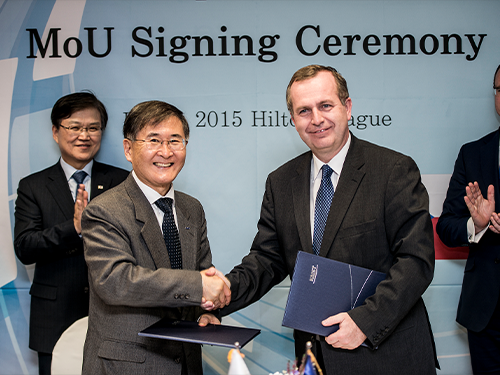 KAIST and Charles University Agree to Cooperate
KAIST and Charles University in Prague, the Czech Republic, agreed to cooperate in research and education.
President Steve Kang of KAIST (pictured on the left) and Rector Tomáš Zima of Charles University signed the agreement on December 2, 2015, at the Hilton Hotel in Prague.
Minster Yang-Hee Choi of Science, ICT and Future Planning of the Republic of Korea and Minister Kateřina Valachová of Education, Youth and Sports of the Czech Republic also joined the signing ceremony.
Under the agreement, the two institutions will exchange students and researchers, as well as implement joint research programs.
President Kang said, “We are pleased to work with one of the most prestigious universities in the Czech Republic and hope to build a good partnership in the years ahead.”
Founded in 1348, Charles University in Prague is the oldest and largest university in the Czech Republic. The university received two Nobel prizes in physiology or medicine and in chemistry in 1947 and 1959, respectively.
2015.12.03 View 8988
KAIST and Charles University Agree to Cooperate
KAIST and Charles University in Prague, the Czech Republic, agreed to cooperate in research and education.
President Steve Kang of KAIST (pictured on the left) and Rector Tomáš Zima of Charles University signed the agreement on December 2, 2015, at the Hilton Hotel in Prague.
Minster Yang-Hee Choi of Science, ICT and Future Planning of the Republic of Korea and Minister Kateřina Valachová of Education, Youth and Sports of the Czech Republic also joined the signing ceremony.
Under the agreement, the two institutions will exchange students and researchers, as well as implement joint research programs.
President Kang said, “We are pleased to work with one of the most prestigious universities in the Czech Republic and hope to build a good partnership in the years ahead.”
Founded in 1348, Charles University in Prague is the oldest and largest university in the Czech Republic. The university received two Nobel prizes in physiology or medicine and in chemistry in 1947 and 1959, respectively.
2015.12.03 View 8988 -
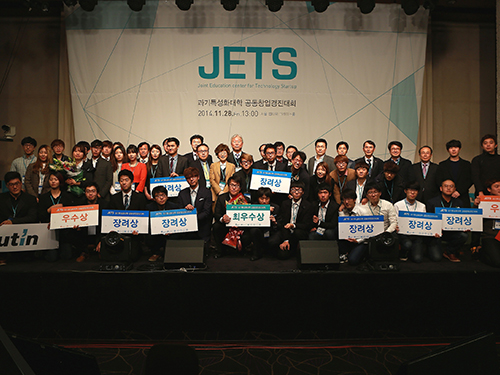 KAIST and Four Science and Technology Universities Host a Start-up Competition
KAIST and four other science and technology universities, such as Gwangju Institute of Science and Technology (GIST), Ulsan National Institute of Science and Technology (UNIST), Daegu Gyeongbuk Institute of Science and Technology (DGIST), and Pohang University of Science and Technology (POSTECH), hosted a startup competition on November 27, 2015 at the Dongdaemun Design Plaza in Seoul.
Approximately 150 participants including students from the five universities, "angel" investors, and entrepreneurs attended the competition.
The competition was held to promote startups that are based on research achievements in science and technology and to foster entrepreneurs with great potential.
Two hundred and sixty applicants from 81 teams competed this year. Only ten teams made it to the finals.
KAIST students presented two business plans: an experience-centered education platform and mobile taxi-pooling service. Students from other universities presented a brain-stimulating simulation software (GIST), handy smart health trainer (GIST), real-time reporting system for luggage (DGIST), a flower delivery system (UNIST), surveillance and alarm system for stock-related events via machinery studies (UNIST), augmented emotion toys using augmented reality (POSTECH), and a nasal spray for fine dust prevention (POSTECH).
KAIST also displayed an exhibition of “wearable haptic device for multimedia contents” and “next generation recommendation service platform based on one-on-one matching system with high expandability and improved user experience system.”
The winning team received an award from the Minister of Science, ICT and Future Planning of Korea, as well as an opportunity to participate in overseas startup programs over the course of ten days.
Joongmyeon Bae, Director of the KAIST Industry and University Cooperation, who organized the contest, said, “The alumni of Stanford University (USA) has annually created over 5.4 million jobs through startup activities. Likewise, we hope that our event will contribute to job creation by fostering innovative entrepreneurs.”
2015.11.26 View 12788
KAIST and Four Science and Technology Universities Host a Start-up Competition
KAIST and four other science and technology universities, such as Gwangju Institute of Science and Technology (GIST), Ulsan National Institute of Science and Technology (UNIST), Daegu Gyeongbuk Institute of Science and Technology (DGIST), and Pohang University of Science and Technology (POSTECH), hosted a startup competition on November 27, 2015 at the Dongdaemun Design Plaza in Seoul.
Approximately 150 participants including students from the five universities, "angel" investors, and entrepreneurs attended the competition.
The competition was held to promote startups that are based on research achievements in science and technology and to foster entrepreneurs with great potential.
Two hundred and sixty applicants from 81 teams competed this year. Only ten teams made it to the finals.
KAIST students presented two business plans: an experience-centered education platform and mobile taxi-pooling service. Students from other universities presented a brain-stimulating simulation software (GIST), handy smart health trainer (GIST), real-time reporting system for luggage (DGIST), a flower delivery system (UNIST), surveillance and alarm system for stock-related events via machinery studies (UNIST), augmented emotion toys using augmented reality (POSTECH), and a nasal spray for fine dust prevention (POSTECH).
KAIST also displayed an exhibition of “wearable haptic device for multimedia contents” and “next generation recommendation service platform based on one-on-one matching system with high expandability and improved user experience system.”
The winning team received an award from the Minister of Science, ICT and Future Planning of Korea, as well as an opportunity to participate in overseas startup programs over the course of ten days.
Joongmyeon Bae, Director of the KAIST Industry and University Cooperation, who organized the contest, said, “The alumni of Stanford University (USA) has annually created over 5.4 million jobs through startup activities. Likewise, we hope that our event will contribute to job creation by fostering innovative entrepreneurs.”
2015.11.26 View 12788 -
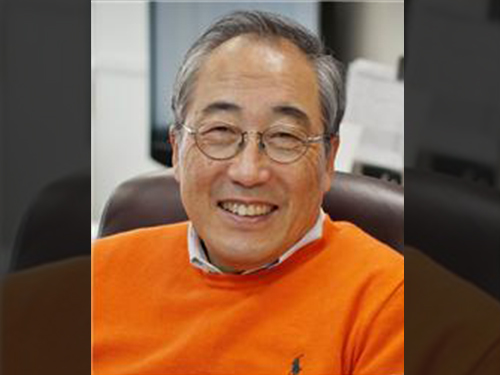 Yang-Hann Kim named recipient of the Rossing Prize in Acoustics Education by the Acoustical Society of America
Courtesy of the Acoustical Society of America (ASA)
Press release issued by ASA on October 8, 2015:
Yang-Hann Kim named recipient of the Rossing Prize in Acoustics Education by the Acoustical Society of America
Melville (NY), 8 October 2015—Yang-Hann Kim, Professor at KAIST (Korea Advanced Institute of Science and Technology), Daejeon, has been named recipient of the Acoustical Society of America (ASA) Rossing Prize in Acoustics Education. The Rossing Prize is awarded to an individual who has made significant contributions toward furthering acoustics education through distinguished teaching, creation of educational materials, textbook writing and other activities. The Prize will be presented at the 170th meeting of the ASA on 4 November 2015 in Jacksonville, Florida.
“It is my great honor to receive the Rossing Prize, which has been given to outstanding scholar members of ASA since 2003. I never dreamed to be one of them.” said Kim. “I must express my deep respect and love to my friend Thomas Rossing: I have known him more than 20 years, always respect what he has done for teaching, writing books, and pioneering work in musical acoustics.”
Yang-Hann Kim is a Fellow of the Acoustical Society of America. He received a Ph.D. from the Massachusetts Institute of Technology. His main research interests in acoustics began with “sound visualization” resulted in the development of the “sound camera” which makes any sound visible instantly. Then he moved to “sound manipulation.” Using his manipulation technology, one can move any sound in space and time, positioning sound, and can create a private sound zone. Sound Visualization and Manipulation, (Wiley, 2013), summarizes these two fields. Dr. Kim’s textbook, Sound Propagation: An Impedance Based Approach (John Wiley and Sons, 2010), is well acknowledged by the associated professional communities as one of best acoustics textbooks. Using his teaching experience at KAIST, he created a YouTube lecture on acoustics and vibration which is also available in MOOC (Massive Open Online Course). He has also presented lectures to over 500 engineers and technicians for the past 30 years.
###
The Acoustical Society of America (ASA) is the premier international scientific society in acoustics devoted to the science and technology of sound. Its 7000 members worldwide represent a broad spectrum of the study of acoustics. ASA publications include the Journal of the Acoustical Society of America—the world’s leading journal on acoustics, Acoustics Today magazine, books, and standards on acoustics. The Society also holds two major scientific meetings per year. For more information about the Society visit our website, www.acousticalsociety.org.
2015.10.06 View 11068
Yang-Hann Kim named recipient of the Rossing Prize in Acoustics Education by the Acoustical Society of America
Courtesy of the Acoustical Society of America (ASA)
Press release issued by ASA on October 8, 2015:
Yang-Hann Kim named recipient of the Rossing Prize in Acoustics Education by the Acoustical Society of America
Melville (NY), 8 October 2015—Yang-Hann Kim, Professor at KAIST (Korea Advanced Institute of Science and Technology), Daejeon, has been named recipient of the Acoustical Society of America (ASA) Rossing Prize in Acoustics Education. The Rossing Prize is awarded to an individual who has made significant contributions toward furthering acoustics education through distinguished teaching, creation of educational materials, textbook writing and other activities. The Prize will be presented at the 170th meeting of the ASA on 4 November 2015 in Jacksonville, Florida.
“It is my great honor to receive the Rossing Prize, which has been given to outstanding scholar members of ASA since 2003. I never dreamed to be one of them.” said Kim. “I must express my deep respect and love to my friend Thomas Rossing: I have known him more than 20 years, always respect what he has done for teaching, writing books, and pioneering work in musical acoustics.”
Yang-Hann Kim is a Fellow of the Acoustical Society of America. He received a Ph.D. from the Massachusetts Institute of Technology. His main research interests in acoustics began with “sound visualization” resulted in the development of the “sound camera” which makes any sound visible instantly. Then he moved to “sound manipulation.” Using his manipulation technology, one can move any sound in space and time, positioning sound, and can create a private sound zone. Sound Visualization and Manipulation, (Wiley, 2013), summarizes these two fields. Dr. Kim’s textbook, Sound Propagation: An Impedance Based Approach (John Wiley and Sons, 2010), is well acknowledged by the associated professional communities as one of best acoustics textbooks. Using his teaching experience at KAIST, he created a YouTube lecture on acoustics and vibration which is also available in MOOC (Massive Open Online Course). He has also presented lectures to over 500 engineers and technicians for the past 30 years.
###
The Acoustical Society of America (ASA) is the premier international scientific society in acoustics devoted to the science and technology of sound. Its 7000 members worldwide represent a broad spectrum of the study of acoustics. ASA publications include the Journal of the Acoustical Society of America—the world’s leading journal on acoustics, Acoustics Today magazine, books, and standards on acoustics. The Society also holds two major scientific meetings per year. For more information about the Society visit our website, www.acousticalsociety.org.
2015.10.06 View 11068 -
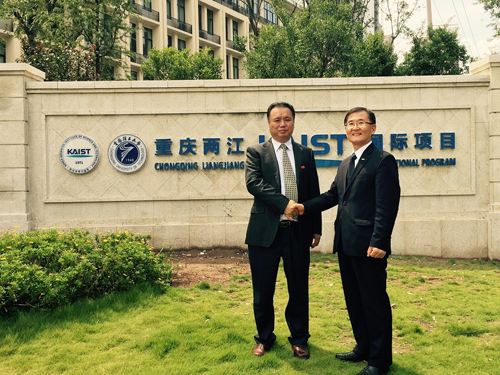 KAIST and Chongqing University of Technology in China Open an International Program
With the help of KAIST, Chongqing University of Technology (CQUT) in China established an electrical engineering and computer science program and admitted their first 66 freshmen this fall semester.
The joint program was created to foster skilled engineers in the fields of electrical engineering and computer science, which are necessary for the development of the Korean and Chinese Industrial Complex located in Chongqing City.
KAIST has provided CQUT with a majority of the program’s curricula currently offered to its students in Daejeon, Korea.
Under the jointly administered program, KAIST takes on education and research while CQUT is responsible for student selection and administration.
KAIST has dispatched eight professors to teach the related fields in English, and 17 CQUT professors will teach the rest of the curricula.
In August 2014, KAIST and CQUT singed a cooperation agreement for education and research exchange and created the CQUT-KAIST Education Cooperation Center, which is headed by Professor Young-Nam Han of the Electrical Engineering Department at KAIST.
The two universities will expand their collaboration to include graduate programs by 2016.
In the picture below, President Steve Kang of KAIST (right) shakes hands with President Shi Xiaohui of Chongqing University of Technology (left).
2015.09.17 View 12292
KAIST and Chongqing University of Technology in China Open an International Program
With the help of KAIST, Chongqing University of Technology (CQUT) in China established an electrical engineering and computer science program and admitted their first 66 freshmen this fall semester.
The joint program was created to foster skilled engineers in the fields of electrical engineering and computer science, which are necessary for the development of the Korean and Chinese Industrial Complex located in Chongqing City.
KAIST has provided CQUT with a majority of the program’s curricula currently offered to its students in Daejeon, Korea.
Under the jointly administered program, KAIST takes on education and research while CQUT is responsible for student selection and administration.
KAIST has dispatched eight professors to teach the related fields in English, and 17 CQUT professors will teach the rest of the curricula.
In August 2014, KAIST and CQUT singed a cooperation agreement for education and research exchange and created the CQUT-KAIST Education Cooperation Center, which is headed by Professor Young-Nam Han of the Electrical Engineering Department at KAIST.
The two universities will expand their collaboration to include graduate programs by 2016.
In the picture below, President Steve Kang of KAIST (right) shakes hands with President Shi Xiaohui of Chongqing University of Technology (left).
2015.09.17 View 12292 -
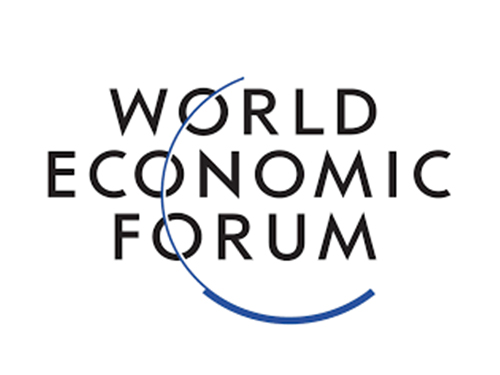 KAIST Participates in the World Economic Forum's Annual Meeting of the New Champions 2015 in China
KAIST’s president and its professors actively engage in discussions of major issues on higher education, technology innovation, and industry-university collaboration with global leaders from across all sectors.
President Steve Kang of KAIST participated in the Annual Meeting of the New Champions 2015 (a.k.a., Summer Davos Forum) hosted by the World Economic Forum (WEF). With the theme of “Charting a New Course for Growth,” the Summer Davos Forum took place on September 9-11, 2015 in, Dalian, China.
Currently, KAIST is a member of the Global University Leaders Forum (GULF) of WEF, a gathering of the presidents of the top 25 universities in the world, including Harvard University, Massachusetts Institute of Technology, University of Tokyo, University of Oxford, Peking University, and National University of Singapore. GULF allows university leaders an opportunity to have high-level dialogues on higher education and research and explore prospects for cooperative ventures.
President Kang led the discussion of the GULF session at the Summer Davos Forum, which was held on September 10, 2015, with 25 university leaders as well as two business leaders from Chinese companies: Huawei Technologies Co. Ltd., and Sanofi China. The participants shared candid perspectives on industry-university collaboration, particularly the need for such partnerships in Asia.
In addition, KAIST hosted the fourth IdeasLab session, entitled “Bio versus Nano Materials, on September 9, 2015. At the session, four KAIST professors held an in-depth debate and discussion with the audience on whether the next industrial revolution would be driven by advances in biomaterials or nanomaterials.
The topics under discussion were:
- New materials that mimic biology by Professor Hea Shin Lee
- Bio-based materials that replace petroleum-based materials by Professor Sang Yup Lee
- New materials designed at sub-nano scale by Professor Hee Tae Jung
- A hydrogen economy with nanomaterials by Professor Eun Ae Cho
Since its establishment in 2007, the Summer Davos Forum has become the biggest business and political gathering in Asia, held annually either in Dalian or Tianjin, China. The Forum has attracted more than 1,500 participants primarily from emerging nations such as China, India, Russia, Mexico, and Brazil, and has offered an open platform to address issues important to the region and the global community.
2015.09.14 View 9744
KAIST Participates in the World Economic Forum's Annual Meeting of the New Champions 2015 in China
KAIST’s president and its professors actively engage in discussions of major issues on higher education, technology innovation, and industry-university collaboration with global leaders from across all sectors.
President Steve Kang of KAIST participated in the Annual Meeting of the New Champions 2015 (a.k.a., Summer Davos Forum) hosted by the World Economic Forum (WEF). With the theme of “Charting a New Course for Growth,” the Summer Davos Forum took place on September 9-11, 2015 in, Dalian, China.
Currently, KAIST is a member of the Global University Leaders Forum (GULF) of WEF, a gathering of the presidents of the top 25 universities in the world, including Harvard University, Massachusetts Institute of Technology, University of Tokyo, University of Oxford, Peking University, and National University of Singapore. GULF allows university leaders an opportunity to have high-level dialogues on higher education and research and explore prospects for cooperative ventures.
President Kang led the discussion of the GULF session at the Summer Davos Forum, which was held on September 10, 2015, with 25 university leaders as well as two business leaders from Chinese companies: Huawei Technologies Co. Ltd., and Sanofi China. The participants shared candid perspectives on industry-university collaboration, particularly the need for such partnerships in Asia.
In addition, KAIST hosted the fourth IdeasLab session, entitled “Bio versus Nano Materials, on September 9, 2015. At the session, four KAIST professors held an in-depth debate and discussion with the audience on whether the next industrial revolution would be driven by advances in biomaterials or nanomaterials.
The topics under discussion were:
- New materials that mimic biology by Professor Hea Shin Lee
- Bio-based materials that replace petroleum-based materials by Professor Sang Yup Lee
- New materials designed at sub-nano scale by Professor Hee Tae Jung
- A hydrogen economy with nanomaterials by Professor Eun Ae Cho
Since its establishment in 2007, the Summer Davos Forum has become the biggest business and political gathering in Asia, held annually either in Dalian or Tianjin, China. The Forum has attracted more than 1,500 participants primarily from emerging nations such as China, India, Russia, Mexico, and Brazil, and has offered an open platform to address issues important to the region and the global community.
2015.09.14 View 9744 -
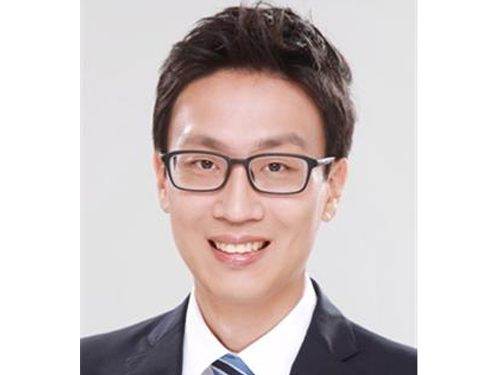 Professor Kyoungsik Yu Receives the Young IT Engineer Award from IEEE and IEIE of Korea
Professor Kyoungsik Yu of KAIST’s Department of Electrical Engineering is the recipient of this year’s Young IT (Information Technology) Engineer Award that was co-hosted by the Institute of Electrical and Electronics Engineers (IEEE), the Institute of Electronics Engineers of Korea (IEIE), and Haedong Science Culture Foundation in Korea. The award was presented on June 22, 2015 at The Ramada Plaza Jeju Hotel on Jeju Island, Korea.
The Young IT Engineer Award is given to emerging scientists who have made significant contributions to the advancement of technology, society, environment, and creative education.
Professor Yu's main research interests are IT, energy, and imaging through miniaturization and integration of optoelectronic devices. His contribution to academic and technological development is reflected in his publication of more than 100 papers in international journals and conferences, which were cited over 2,200 times.
Professor Yu said, “I’m honored to receive this award and am encouraged by it. I also find the award meaningful because the United Nations has designated this year as the “International Year of Light and Light-based Technologies,” the field I have been involved in as a researcher.”
In addition to Korea, the IEEE has jointly hosted and presented this award to researchers in countries such as Chile, Ecuador, Peru, Singapore, and Italy.
2015.06.22 View 13970
Professor Kyoungsik Yu Receives the Young IT Engineer Award from IEEE and IEIE of Korea
Professor Kyoungsik Yu of KAIST’s Department of Electrical Engineering is the recipient of this year’s Young IT (Information Technology) Engineer Award that was co-hosted by the Institute of Electrical and Electronics Engineers (IEEE), the Institute of Electronics Engineers of Korea (IEIE), and Haedong Science Culture Foundation in Korea. The award was presented on June 22, 2015 at The Ramada Plaza Jeju Hotel on Jeju Island, Korea.
The Young IT Engineer Award is given to emerging scientists who have made significant contributions to the advancement of technology, society, environment, and creative education.
Professor Yu's main research interests are IT, energy, and imaging through miniaturization and integration of optoelectronic devices. His contribution to academic and technological development is reflected in his publication of more than 100 papers in international journals and conferences, which were cited over 2,200 times.
Professor Yu said, “I’m honored to receive this award and am encouraged by it. I also find the award meaningful because the United Nations has designated this year as the “International Year of Light and Light-based Technologies,” the field I have been involved in as a researcher.”
In addition to Korea, the IEEE has jointly hosted and presented this award to researchers in countries such as Chile, Ecuador, Peru, Singapore, and Italy.
2015.06.22 View 13970 -
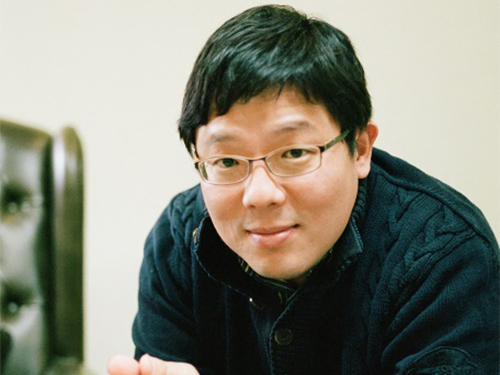 Science and Technology Policy Professor Chihyung Jeon Awarded Rachel Carson Fellowship
KAIST Graduate School of Science and Technology Policy Professor Chihyung Jeon has been awarded the Rachel Carson Fellowship 2015-2016.
Rachel Carson Center for Environment and Society is a research center for environmental humanities and social sciences, supported by the German Federal Ministry of Education and Research. It was founded by Ludwig-Maximilians-Universität, Munich, Germany and the Deutsches Museum as a joint initiative in 2009.
Rachel Carson Center supports researches in humanities and social sciences on the interactions between the environment and the society, following the footsteps of Rachel Cason, who raised awareness on the chemical environmental damage and started global environmental movement through her published book “Silent Spring” in 1962.
The center is awarding Rachel Carson Fellowships to established researchers to fund their writing and promote exchange of research. This year, 31 fellowships were awarded.
Professor Jeon will conduct research on "A Dredged Nation: The Four Rivers Restoration Project and the Envirotechnical Transformation of South Korea" and will also hold an additional post of International Curatorial Fellow at the Deutsches Museum.
2015.06.11 View 11496
Science and Technology Policy Professor Chihyung Jeon Awarded Rachel Carson Fellowship
KAIST Graduate School of Science and Technology Policy Professor Chihyung Jeon has been awarded the Rachel Carson Fellowship 2015-2016.
Rachel Carson Center for Environment and Society is a research center for environmental humanities and social sciences, supported by the German Federal Ministry of Education and Research. It was founded by Ludwig-Maximilians-Universität, Munich, Germany and the Deutsches Museum as a joint initiative in 2009.
Rachel Carson Center supports researches in humanities and social sciences on the interactions between the environment and the society, following the footsteps of Rachel Cason, who raised awareness on the chemical environmental damage and started global environmental movement through her published book “Silent Spring” in 1962.
The center is awarding Rachel Carson Fellowships to established researchers to fund their writing and promote exchange of research. This year, 31 fellowships were awarded.
Professor Jeon will conduct research on "A Dredged Nation: The Four Rivers Restoration Project and the Envirotechnical Transformation of South Korea" and will also hold an additional post of International Curatorial Fellow at the Deutsches Museum.
2015.06.11 View 11496 -
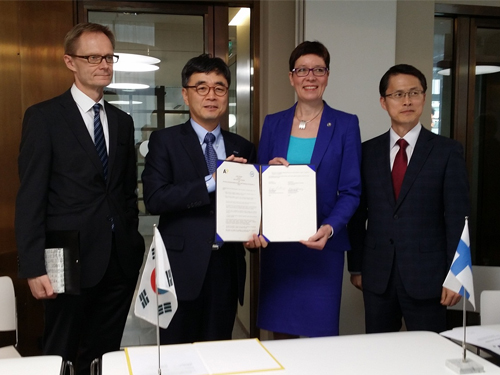 KAIST to Kick-Start the Exchange of Young Researchers with Northern European Universities
KAIST promotes research exchange and cooperation with three universities in Northern Europe.
KAIST has signed a letter of intent (LOI) for the mutual exchange of young researchers and cooperation to collaborate with KTH Royal Institute of Technology and Lund University, both based in Sweden on June 2, 2015, and with Aalto University in Finland on June 4, 2015.
This LOI was the result of the cooperative projects of Korea-Sweden and Korea-Finland Joint Committees on Science and Technology supervised by the Ministry of Science, ICT and Future Planning of Korea.
As agreed in the LOI, KAIST will conduct joint research projects with the three universities by providing students and researchers with opportunities to visit each other through internship programs and workshops and by sharing information on education and research.
Sung-Hyon Mayeng, the Associate Vice President of the International Relations Office at KAIST, said, “It’s an encouraging sign that universities and governments recognize the importance of increasing exchanges among academic and research communities. Expecting more vibrant relationships to be formed between KAIST and the three northern European universities in coming years, I hope that today’s agreement becomes a good basis to spur technological innovations that will not only benefit the regions but also the world.”
Established in 1827, the KTH Royal Institute of Technology is the largest and oldest technical university in Sweden, accounting for one-third of the nation’s technical research and engineering education capacity at university level. The university offers education and research programs from natural sciences to all branches of engineering including architecture, industrial management, and urban planning. According to the QS World University Rankings in 2014, KTH Royal Institute of Technology ranked 27th in engineering and 1st in Northern Europe.
Lund University, Sweden, is one of the oldest and most prestigious universities in northern Europe, consistently ranking among the world’s top 100 universities. In particular, its biological sciences and engineering have shown great strength, placing within the top 60 universities by the Times Higher Education (THE) World University Rankings. The university also receives the largest amount of research funding from the Swedish government.
Aalto University in Finland was created as a merger of three leading Finnish universities: the Helsinki University of Technology (established 1849), the Helsinki School of Economics (established 1904), and the University of Art and Design Helsinki (established 1871). The university nurtures the close collaborations across science, business, and arts to foster multi-disciplinary education and research.
2015.06.04 View 9741
KAIST to Kick-Start the Exchange of Young Researchers with Northern European Universities
KAIST promotes research exchange and cooperation with three universities in Northern Europe.
KAIST has signed a letter of intent (LOI) for the mutual exchange of young researchers and cooperation to collaborate with KTH Royal Institute of Technology and Lund University, both based in Sweden on June 2, 2015, and with Aalto University in Finland on June 4, 2015.
This LOI was the result of the cooperative projects of Korea-Sweden and Korea-Finland Joint Committees on Science and Technology supervised by the Ministry of Science, ICT and Future Planning of Korea.
As agreed in the LOI, KAIST will conduct joint research projects with the three universities by providing students and researchers with opportunities to visit each other through internship programs and workshops and by sharing information on education and research.
Sung-Hyon Mayeng, the Associate Vice President of the International Relations Office at KAIST, said, “It’s an encouraging sign that universities and governments recognize the importance of increasing exchanges among academic and research communities. Expecting more vibrant relationships to be formed between KAIST and the three northern European universities in coming years, I hope that today’s agreement becomes a good basis to spur technological innovations that will not only benefit the regions but also the world.”
Established in 1827, the KTH Royal Institute of Technology is the largest and oldest technical university in Sweden, accounting for one-third of the nation’s technical research and engineering education capacity at university level. The university offers education and research programs from natural sciences to all branches of engineering including architecture, industrial management, and urban planning. According to the QS World University Rankings in 2014, KTH Royal Institute of Technology ranked 27th in engineering and 1st in Northern Europe.
Lund University, Sweden, is one of the oldest and most prestigious universities in northern Europe, consistently ranking among the world’s top 100 universities. In particular, its biological sciences and engineering have shown great strength, placing within the top 60 universities by the Times Higher Education (THE) World University Rankings. The university also receives the largest amount of research funding from the Swedish government.
Aalto University in Finland was created as a merger of three leading Finnish universities: the Helsinki University of Technology (established 1849), the Helsinki School of Economics (established 1904), and the University of Art and Design Helsinki (established 1871). The university nurtures the close collaborations across science, business, and arts to foster multi-disciplinary education and research.
2015.06.04 View 9741 -
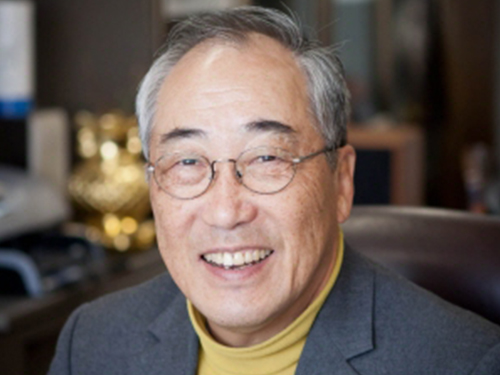 The Acoustical Society of America Names Yang Hann Kim of KAIST the Recipient of the 2015 Rossing Prize in Acoustics Education
The award, given to Dr. Kim in recognition of his contributions to the advancement of acoustics education, will be presented during the 170th Meeting of the Acoustical Society of America on November 2-6, 2015 in Jacksonville, Florida.
The Acoustical Society of America (ASA) announced today that Professor Yang Hann Kim of the Mechanical Engineering Department at the Korea Advanced Institute of Science and Technology (KAIST) was the 12th recipient of the Rossing Prize in Acoustics Education. Dr. Kim is the first recipient selected from a non-English-speaking nation.
The Rossing Prize in Acoustics Education was established in 2003 from a generous gift made to the ASA Foundation by Thomas D. Rossing to recognize an individual who has made significant contributions to the advancement of acoustics education through distinguished teaching, creation of educational materials, textbook writing, and other activities.
During 25 years of teaching and conducting research in acoustics, noise, and vibration at KAIST, Dr. Kim has advised 26 doctorates and published over 200 research papers in journals such as Journal of Acoustical Society of America, Journal of Sound and Vibration, and Journal of Mechanical Systems and Signal Processing. He also wrote two acoustics textbooks for university education, which has been widely read worldwide. The textbook titles are: Sound Propagation: An Impedance Based Approach (Wiley, July 2010) and with the co-author, Dr. Jung-Woo Choi, Sound Visualization and Manipulation (Wiley, September 2013).
Since 2009, Professor Kim has lectured an online course entitled “Introduction to Acoustics,” offering students and the general public throughout the world guidance to study acoustics through the basic concept of impedance, for example, on vibrations and waves.
Dr. Kim will receive the award during ASA’s 170th conference to be held on November 2-6, 2015 at the Hyatt Regency Jacksonville Riverfront Hotel in Jacksonville, Florida, USA.
For the list of previous recipients of the Rossing Prize in Acoustics Education,
see:http://acousticalsociety.org/funding_resources/prizes#rossing
2015.06.04 View 10556
The Acoustical Society of America Names Yang Hann Kim of KAIST the Recipient of the 2015 Rossing Prize in Acoustics Education
The award, given to Dr. Kim in recognition of his contributions to the advancement of acoustics education, will be presented during the 170th Meeting of the Acoustical Society of America on November 2-6, 2015 in Jacksonville, Florida.
The Acoustical Society of America (ASA) announced today that Professor Yang Hann Kim of the Mechanical Engineering Department at the Korea Advanced Institute of Science and Technology (KAIST) was the 12th recipient of the Rossing Prize in Acoustics Education. Dr. Kim is the first recipient selected from a non-English-speaking nation.
The Rossing Prize in Acoustics Education was established in 2003 from a generous gift made to the ASA Foundation by Thomas D. Rossing to recognize an individual who has made significant contributions to the advancement of acoustics education through distinguished teaching, creation of educational materials, textbook writing, and other activities.
During 25 years of teaching and conducting research in acoustics, noise, and vibration at KAIST, Dr. Kim has advised 26 doctorates and published over 200 research papers in journals such as Journal of Acoustical Society of America, Journal of Sound and Vibration, and Journal of Mechanical Systems and Signal Processing. He also wrote two acoustics textbooks for university education, which has been widely read worldwide. The textbook titles are: Sound Propagation: An Impedance Based Approach (Wiley, July 2010) and with the co-author, Dr. Jung-Woo Choi, Sound Visualization and Manipulation (Wiley, September 2013).
Since 2009, Professor Kim has lectured an online course entitled “Introduction to Acoustics,” offering students and the general public throughout the world guidance to study acoustics through the basic concept of impedance, for example, on vibrations and waves.
Dr. Kim will receive the award during ASA’s 170th conference to be held on November 2-6, 2015 at the Hyatt Regency Jacksonville Riverfront Hotel in Jacksonville, Florida, USA.
For the list of previous recipients of the Rossing Prize in Acoustics Education,
see:http://acousticalsociety.org/funding_resources/prizes#rossing
2015.06.04 View 10556 -
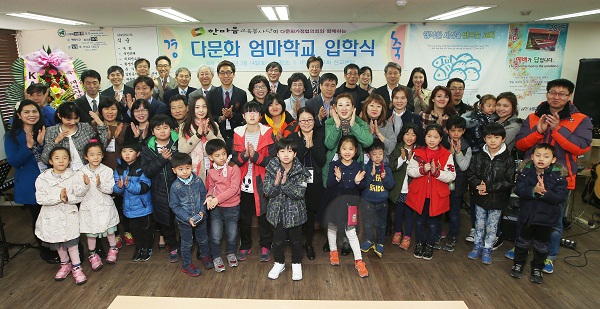 Emeritus Professors' Social Service for Embracing Multicultural Families
Korea has become a melting pot over recent years, with many families embracing diverse nationalities, cultures, and ethnicities. A group of KAIST emeritus professors volunteered to help these multicultural families, which are often formed through international marriages, better cope with life in Korea by creating a continuing education program called “Multicultural Mother School.”
The school admitted a total of ten non-Korean mothers for its first class and held an entrance ceremony for the students on March 14, 2015, at the IFC Hope Church in Daejeon. Classes began since March 16, 2015, offering the first lecture to students remotely via the Internet.
Professor Emeritus Byung-Kyu Choi, who organized the volunteering program and is the director of the Multicultural Mother School, said, “About 5% of newborns in Korea currently come from multicultural families. It is important that we should support them to assimilate well into the Korean society. Since 60% of multicultural children have yet to enter the public school system, particularly at the elementary schools level, offering their mothers opportunities to learn more about Korea will serve a greater good.”
2015.03.14 View 6888
Emeritus Professors' Social Service for Embracing Multicultural Families
Korea has become a melting pot over recent years, with many families embracing diverse nationalities, cultures, and ethnicities. A group of KAIST emeritus professors volunteered to help these multicultural families, which are often formed through international marriages, better cope with life in Korea by creating a continuing education program called “Multicultural Mother School.”
The school admitted a total of ten non-Korean mothers for its first class and held an entrance ceremony for the students on March 14, 2015, at the IFC Hope Church in Daejeon. Classes began since March 16, 2015, offering the first lecture to students remotely via the Internet.
Professor Emeritus Byung-Kyu Choi, who organized the volunteering program and is the director of the Multicultural Mother School, said, “About 5% of newborns in Korea currently come from multicultural families. It is important that we should support them to assimilate well into the Korean society. Since 60% of multicultural children have yet to enter the public school system, particularly at the elementary schools level, offering their mothers opportunities to learn more about Korea will serve a greater good.”
2015.03.14 View 6888 -
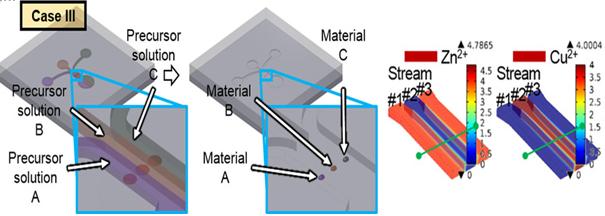 KAIST Develops Subminiature, Power-Efficient Air Pollution Sensing Probe
Professor Inkyu Park and his research team from the Department of Mechanical Engineering at KAIST have developed a subminiature, power-efficient air-pollution sensing probe that can be applied to mobile devices. Their research findings were published online in the January 30th issue of Scientific Reports.
As air pollution has increased, people have taken greater interest in health care. The developed technology could allow people to measure independently the air pollution level of their surrounding environments.
Previous instruments used to measure air pollution levels were bulky and consumed a lot of power. They also often produced inaccurate results when measuring air pollution in which different toxic gases were mixed. These problems could not be resolved with existing semiconductor manufacturing process.
Using local temperature field control technology, Professor Park’s team succeeded in integrating multiple heterogeneous nanomaterials and fitting them onto a small, low-power electronic chip. This microheating sensor can heat microscale regions through local hydrothermal synthesis. Because it requires a miniscale amount of nanomaterials to manufacture, the sensor is most suitable for mobile devices.
Professor Park said, “Our research will contribute to the development of convergence technology in such field as air pollution sensing probes, biosensors, electronic devices, and displays.”
The team's research was supported by the Ministry of Education and the Ministry of Science, ICT and Future Planning, Republic of Korea.
Figure 1 – The Concept of Multiple Nanomaterial Device and Numerical Simulation Results of Precursor Solutions
Figure 2 - Multiple Nanomaterial Manufactured in a Microscale Region
2015.02.27 View 11964
KAIST Develops Subminiature, Power-Efficient Air Pollution Sensing Probe
Professor Inkyu Park and his research team from the Department of Mechanical Engineering at KAIST have developed a subminiature, power-efficient air-pollution sensing probe that can be applied to mobile devices. Their research findings were published online in the January 30th issue of Scientific Reports.
As air pollution has increased, people have taken greater interest in health care. The developed technology could allow people to measure independently the air pollution level of their surrounding environments.
Previous instruments used to measure air pollution levels were bulky and consumed a lot of power. They also often produced inaccurate results when measuring air pollution in which different toxic gases were mixed. These problems could not be resolved with existing semiconductor manufacturing process.
Using local temperature field control technology, Professor Park’s team succeeded in integrating multiple heterogeneous nanomaterials and fitting them onto a small, low-power electronic chip. This microheating sensor can heat microscale regions through local hydrothermal synthesis. Because it requires a miniscale amount of nanomaterials to manufacture, the sensor is most suitable for mobile devices.
Professor Park said, “Our research will contribute to the development of convergence technology in such field as air pollution sensing probes, biosensors, electronic devices, and displays.”
The team's research was supported by the Ministry of Education and the Ministry of Science, ICT and Future Planning, Republic of Korea.
Figure 1 – The Concept of Multiple Nanomaterial Device and Numerical Simulation Results of Precursor Solutions
Figure 2 - Multiple Nanomaterial Manufactured in a Microscale Region
2015.02.27 View 11964